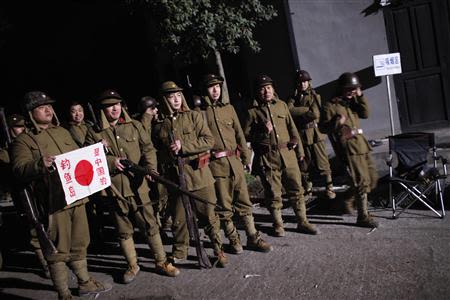- 28 May 2013 18:44
#14244568
The Nazis get made fun of with Broadway musicals. The Germans don't.....but the Mormons do.
I find it interesting that the Chinese are not having mass riots over the Hashimoto remarks. It could be a case that the Chinese government has not allowed attention (to be paid towards Hashimoto) in the local press.
There were plans for an Auschwitz theme park in Japan about 15 years ago....and I want to say it was supposed to be along sympathetic lines...but it did not come off.
FWIW for sure, I get loads of opportunities to bring up the atrocities of the Japanese Imperial Army with my wife. She is so apolitical I can't get a response out of her....as is the case, she is extremely removed from any connection and doesn't get defensive about anything. She thinks we are all a bunch of kooks in this forum in comparison and cannot understand the thrill of debate.
My Chinese wife, on the other hand, was a different case. Despite even living in Japan, and preferring to live in almost any country compared to China, she would get very angry but it was all a case of ego more than anything political. If she was in China, it was a case about how unfair it was to women. When she was living in Switzerland, she hated how they were so snooty. When she was living in Canada, she felt it was unfair how that was one of the few countries she could freely move to.
Shrugs.
If the Chinese were allowed access to more information, their anger towards Japan would probably get redirected towards more traditional avenues of current displeasure. And that would indeed make the govt of the PRC feel very uneasy. As is the case, they do not have many directions for their frustration to have aim, so the Japanese works for them.
To be fair, people who live in Texas (natives, transplanted Yankees and so on) unleash a parallel frustration out at the Mexicans. Although not as violent, it is probably even more vocal than the Chinese on a domestic level. It is even more baseless and uncalled for than the attitude of the Chinese. Yet, as mentioned, it is certainly not as violent (in terms of attacking embassies with protests) and it rarely is done for international promotional purposes. It is basically the same venting, however. The odd part is it usually is carried out by those who have the least connections to Texas. Example, I know this English gal who lived during the bombings in the UK. She cannot get her mind off the war. She hates the Germans, the Japanese, the Italians and anyone she can think of. Then she sits in her backyard in the country and starts saying crap about how she wishes the Mexicans would go back where they come from.
None of it makes any sense in the 21st century.
But yep, Nazis are great to make fun of. And keep in mind, for some reason American kids in the States, especially in the 1960s (do some research and look up surfer's crosses and motorcycle helmets of the sixties), thought the Germans were a much cooler army than that Allied forces. I cannot even recall parents giving kids hell for that idolization. The idolization certainly wasn't because of political beliefs - undoubtedly it had to be that a efficient fighting machine was something to be noticed. But no one that I can recall thought the Nazis were anything to idolize once one had reached the age of 12.
I have absolutely no problem with the following lyrics by the Ramones:
Well I'm a Nazi Schatzi, I'm a Nazi, yes I am
A Nazi Schatzi, you know I fight for fatherland
A Nazi Schatzi, I'm a Nazi, yes I am
A Nazi Schatzi, you know I fight for fatherland
Little German boy, bein' pushed around
A little German boy, in a German town
A Nazi Schatzi, I'm a Nazi, yes I am
A Nazi Schatzi, you know I fight for fatherland
Well I'm a Nazi Schatzi, I'm a Nazi, yes I am
A Nazi Schatzi, you know I fight for fatherland
Little German boy, bein' pushed around
A little German boy, in a German town
Today your love, tomorrow the world
Today your love, tomorrow the world
Today your love, tomorrow the world
It's funny, it's the Ramones, and there Is a certain amount of empathy in it. In the end, it is just dumb and oddly sung by someone (Joey Ramone) who happens to be Jewish. I cannot recall a single time the Jewish Anti-Defamation League came out to make a protest against the Ramones.
The Japanese, when offered the opportunity of choosing to either berate the Chinese or play up the 'shenanigans' of Mother Theresa as self-serving, will go towards Mother Theresa with at least a 90% ratio. Certainly, this has to do with freedom of information.
Even the humongous concern of the plight of Chinese babies is largely a western concern. One will not find the Japanese complaining much about the tragedy. They did not even seem to be aware of such a situation until Hillary Clinton planted The Year of the Woman in Beijing helping to spread the word.
The issue with the Chinese public (more so than even the govt of China) is that there is this unrealistic attitude that the Japanese of today are the same people as Japan pre-WW2. It just isn't the same country.
And this is probably why United States citizens don't really give a fuck about Iraqis or Vietnamese being some kind of anti-US force, today.
Seriously, imagine UK citizens clamoring in the streets about Zulus in the 21st century. Haha, now THAT'S a riot I want to witness.
"Butter is fresh. Margarine is indestructible."



















 - By Rancid
- By Rancid - By wat0n
- By wat0n - By Fasces
- By Fasces - By Tainari88
- By Tainari88